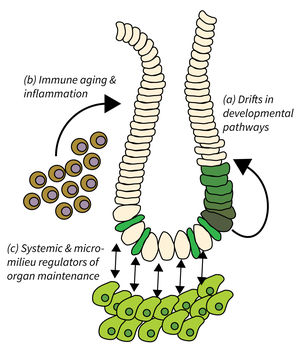Subarea 2: Regeneration and Homeostasis of Organs in Aging
The main goal of Subarea 2 is to identify cellular and molecular pathways used to ensure effective organ maintenance and repair, and to unravel the mechanisms of their deterioration during aging. While stem cells are important for organ homeostasis, this Subarea does not per se directly addresses stem cell aging but rather focusses on the following focus areas:
- Drifts in developmental pathways limiting organ maintenance in aging,
- Immune aging and inflammation, and
- Systemic and micro-milieu regulators of organ maintenance, regeneration, and disease development.
Research focus of Subarea 2
Organ maintenance is regulated by local and systemic factors, which are subject to aging-associated changes. Research of Subarea 2 focuses on the following research areas: a) Genetic and epigenetic modulation of developmental pathways has been shown to contribute to progressive aging and disease. It is critical to delineate mechanisms and consequences of aging-associated drifts to better understand organ maintenance during aging. b) Immunoaging and chronic inflammation elicits negative effects through reduced immune surveillance and aberrant organ repair and maintenance; all of which contributes to the evolution of organ pathologies and diseases during organismal aging. c) Furthermore, aging-associated alterations in systemic and extracellular factors derived from metabolic changes, microbiota alterations, chronic inflammation, senescent, or damaged cells might impinge on disease development and tumor initiation.
Publications
(since 2016)
2019
- Adult stem cells at work: regenerating skeletal muscle.
Schmidt M, Schüler SC, Hüttner SS, von Eyss B, von Maltzahn J
Cell Mol Life Sci 2019, 76(13), 2559-70 - Merlin modulates process outgrowth and synaptogenesis in the cerebellum.
Toledo A, Lang F, Doengi M, Morrison H, Stein V, Baader SL
Brain Struct Funct 2019, 224(6), 2121-42
2018
- C/EBPβ isoforms and the regulation of metabolism: A fine balance between health and disease.
Ackermann T
Dissertation 2018, Groningen, Netherlands - Cell-based RNAi screening and high-content analysis in primary calvarian osteoblasts applied to identification of osteoblast differentiation regulators.
Ahmad M, Kroll T, Jakob J, Rauch A, Ploubidou A, Tuckermann J
Sci Rep 2018, 8(1), 14045 - A new RelB-dependent CD117+ CD172a+ murine dendritic cell subset preferentially induces Th2 differentiation and supports airway hyperresponses in vivo.
Andreas N, Riemann M, Castro CN, Groth M, Koliesnik I, Engelmann C, Sparwasser T, Kamradt T, Haenold R, Weih F
Eur J Immunol 2018, 48(6), 923-36 - Inflammaging impairs peripheral nerve regeneration.
Büttner R
Dissertation 2018, Jena, Germany - Inflammaging impairs peripheral nerve maintenance and regeneration.
Büttner R, Schulz A, Reuter M, Akula AK, Mindos T, Carlstedt A, Riecken LB, Baader SL, Bauer R, Morrison H
Aging Cell 2018, 17(6), e12833 - Therapeutic potential of thyroid hormone analogs in treating Allan-Herndon-Dudley Syndrome.
Chen J
Dissertation 2018, Jena, Germany - Sequential use of milk and bovine serum albumin for streptavidin-probed western blot.
Cui Y, Ma L
Biotechniques 2018, 65(3), 125-6 - Liver Cancer Initiation Requires p53 Inhibition by CD44-Enhanced Growth Factor Signaling.
Dhar D, Antonucci L, Nakagawa H, Kim JY, Glitzner E, Caruso S, Shalapour S, Yang L, Valasek MA, Lee S, Minnich K, Seki E, Tuckermann J, Sibilia M, Zucman-Rossi J, Karin M
Cancer Cell 2018, 33(6), 1061-1077.e6









